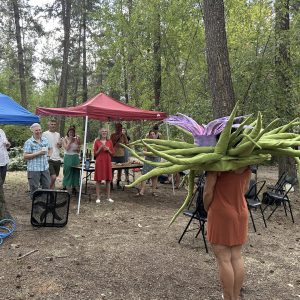
Welcome to the home of the Post-Antropocentrism & Critical Animal Studies Research Group. Here you can find out about upcoming events, our monthly Reading Group and connect with researchers.
Reflections on the “Telling Stories: The Humanities in an Age of Planetary Agenda-Setting” Symposium + Multi-Species Storytelling Workshop
Hosted by the University of British Columbia Okanagan in July 2023, the symposium was supported by a UBCO & Exeter University Catalyst Grant held by Dr. Jodey Castricano (UBCO) in collaboration with Dr. Paul Young and Dr. Ina Linge of the University of Exeter who hosted a parallel event in the UK (May 2023). The two-day event created space for scholars, creatives, and thinkers alike to share in discussions residing at the intersections of environmental sustainability and multispecies storytelling that is no longer limited by anthropocentrism.
Opening the first day of the symposium, we were honoured to have Dean Bryce Traister of the Faculty of Creative and Critical Studies and Anona Kampe, Knowledge Keeper from the Penticton Indian Band thoughtfully frame the day’s topics.
Looking back now at these events being held mere weeks before the catastrophic Okanagan fires of August 2023, such critically engaged discussion regarding our collective crisis feels necessary and timely and still, eerie. The collaboration’s visiting scholars from the University of Exeter, Dr. Ina Linge and Dr. Paul Young, opened their respective morning panels with vigorous and nuanced discussions about the role of comedy in discourses of mass-extinction and by extension, climate emergency, as well as the shift in British orientations towards consumption of animal products traced across history. These works were complemented by contributions from Dr. Jodey Castricano (UBC Okanagan), Holly Cecil (University of Victoria), Zachary Dewitt (UBCO), Anne Furman (UBCO), Brittany Mackenzie-Dale (University of New Brunswick), Avantika Mather (University of Saskatchewan), and Tara Nicholson (UBCO).
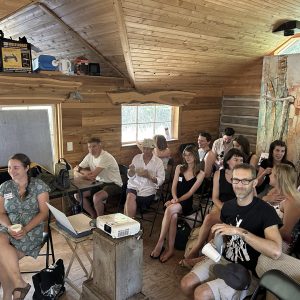 The second day of our event felt both playful and nourishing. We came equipped for what proved to be an incredibly warm Okanagan July day with temperatures over forty degrees Celsius, enjoying the partial shade of Woodhaven Eco-Cultural Centre’s tree-ringed clearing, alongside broad use of electric fans and water misters in the centre’s schoolhouse.
The second day of our event felt both playful and nourishing. We came equipped for what proved to be an incredibly warm Okanagan July day with temperatures over forty degrees Celsius, enjoying the partial shade of Woodhaven Eco-Cultural Centre’s tree-ringed clearing, alongside broad use of electric fans and water misters in the centre’s schoolhouse.
This event, situated deliberately on and in conversation with the land, engaged with short plays, monologues, film shorts, poetry, and creative play and puppetry. This portion of the event prioritized method, and how we, as thinkers, participate in storytelling as co-authors alongside other earthly species. We are grateful and honoured to have hosted Professor Sharon Thesen (Professor Emerita UBCO), Ronan Fraser (UBCO), Anne Furman (UBCO), Ramey Newell (UBCO), Holly Cecil (UVic), and Madeline Donald (UBCO) with the Riparian ReAnimation crew.

Thank you to all speakers and attendees for an incredible experience and discussion. Equally, we would like to thank all the members of the Symposium Committee including Zach DeWitt, Jessica Beaudin and Shauna Oddleifson. For further words on these events, please read attendee Kitty Blandy’s (SFU) blog post: https://sustain.ubc.ca/stories/telling-stories-humanities-age-planetary-agenda-setting
PAST EVENTS:
“Telling Stories: The Humanities in an Age of Planetary Agenda-Setting”
This upcoming symposium is part of a larger public-facing collaborative initiative between the University of British Columbia (Okanagan Campus, Canada) and the University of Exeter (UK), which aims to include Arts/Humanities in local and planetary agenda-setting with respect to ongoing climate crises, rather than situating them as contextual “add-ons” to the concerns of the scientific community.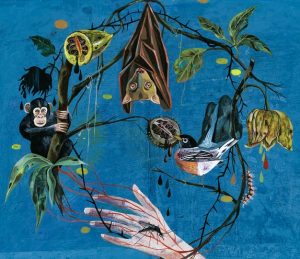
More specifically, the UBC Okanagan iteration of this symposium, which takes place on the Unceded Territory of the Syilx People of the Okanagan Nation, considers what Timothy Morton has called “the net effect”: mass extinction and planetary injustice—exploring the Arts/Humanities as a method in navigating, educating about, and ultimately creating awareness of what it means to live sustainably in an age of mass extinction. As such, our symposium is situated at the interstices of sustainability and multispecies storytelling no longer limited by anthropocentrism.
Find out more and register HERE.
Explore the past ‘Sustainability on Screen’ series with the third film Meat the Future screening Monday, March 20 @ 6:30pm at the Okanagan Threatre. This screening is free and open to all. Click here to sign-up for updates, directions and more info via Eventbrite.
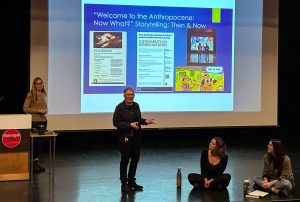 Sustainability on Screen is a series of documentary-screenings, panel discussions and Q&As that will be hosted at Okanagan College with the intention to engage the public with climate activism. Panels and audience-wide Q&As will investigate the significance of the humanities and story-telling has in combatting the climate crisis and societal agenda-setting. All times and locations are the same and each event will be offering refreshments.
Sustainability on Screen is a series of documentary-screenings, panel discussions and Q&As that will be hosted at Okanagan College with the intention to engage the public with climate activism. Panels and audience-wide Q&As will investigate the significance of the humanities and story-telling has in combatting the climate crisis and societal agenda-setting. All times and locations are the same and each event will be offering refreshments.
The series is moderated by Dr. Jodey Castricano (UBCO) and Dr. Shona Harrison (UBCO, OC) and is part of a collaborative project between the University of British Columbia, Okanagan and the University of Exeter (UK). Sustainability on Screen is organized by the Post-Anthropocentrism and Critical Animal Studies Research Group [PACAS] and is supported by a UBC Okanagan-Exeter Excellence Catalyst Grant and the Faculty of Critical and Creative Studies.
By 2018, the Anthropocene was a term increasingly entering public and policy discourses and was understood as a force akin to that of nature, altering the planet’s biosphere and, for the first time, implicating humankind in mass extinctions of plant and animal species, the pollution of the oceans, deforestation and the alteration of the atmosphere, among other serious and even irreversible impacts.
While there was already scientific evidence available regarding the Anthropocene, there seemed a need to move the discussion further into the public realm and use documentary film to jump-start a response to the question “Now What?” in regards daily lived experience.
In 2018, Jodey Castricano and Shona Harrison saw and fulfilled the potential of documentary screenings to inspire public and local engagement and developed the “Welcome to the Anthropocene: Now What?” film program. Between October 2018 and April 2019, the program hosted free screenings of Anthropocene: The Human Epoch, Before the Flood, H.O.P.E. What You Eat Matters, The End of Meat, Speciesism: The Movie and Peaceable Kingdom, The Journey Home.
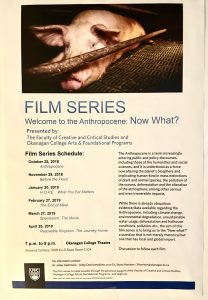
The screenings attracted deeply concerned individuals and audiences who said they were surprised to learn how animal agriculture was contributing to environmental degradation, such as:
- unsustainable water usage
- deforestation
- the acidification of oceans
- hothouse conditions and greenhouse emissions
Fast-forward a few years and we encountered Covid19, yet another of hundreds of zoonotic diseases that represent, as the WHO says, “a major public health problem around the world due to our close relationship with animals in agriculture, as companions and in the natural environment.” January 2023 marks the launch of the second film series: Sustainability on Screen which is the public-facing part of a University of British Columbia Okanagan and University of Exeter collaborative initiative called “Telling Stories: the Humanities in an Age of Planetary Agenda-Setting.” This collaboration aims to include the humanities in local and planetary agenda-setting rather than seeing the humanities and arts as merely a contextual “add-on” to the concerns of the scientific community.
The Sustainability on Screen series is urged by the fact that following the 2022 climate summit (COP27), many humanities scholars, journalists, and activists have come to the conclusion there are just two actions needed to prevent further catastrophic climate breakdown:
- leave fossil fuels in the ground
- stop farming animals
Neither action features in any of the declarations from the 26 climate summits concluded so far with the exception of Costa Rica and Ethiopia. Thanks to the power of petrol and animal agriculture industries, both aims are discursively and overtly pushed into the peripheries of policy-making and agenda-setting.
Georges Monbiot, writer, journalist and activist points out “the silence [around animal agriculture and climate change] is as though nuclear non-proliferation negotiators had decided not to talk about bombs. You cannot address an issue if you will not discuss it.”
The film series, then and now, has been and continues to be aimed at encouraging discussion of the relationship between climate change and animal agriculture which contributes to a rise in global temperatures as to environmental degradation and mass extinctions. The Sustainability on Screen film series is aimed at showing how dismantling the animal-industrial-complex is necessary to address the climate emergency.
